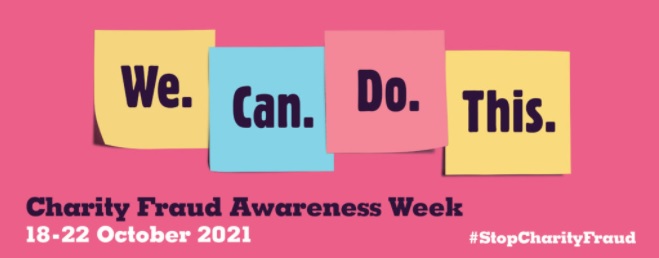The Charity Commission has highlighted the importance of protecting charities against fraud and cybercrime after new figures show that the sector reported almost £8.6million of lost funds in the financial year.
The latest data from Action Fraud shows that there were 1,059 separate incidents of fraud reported by charities between April 2020 – March 2021.
The increase in cybercrime may be a result of the pandemic, with other figures showing that around 65% of charities* feel this has increased their susceptibility to fraud due to an increase in remote working and virtual sign-off processes.

The figures emphasise the need for increased protection and more awareness of the potential threats posed by cybercrime. The Commission has published these figures as part of Charity Fraud Awareness Week, that runs from 18-22 October. The purpose of the week is to raise awareness of cybercrime and to create a safe space for charities and their supporters to talk about fraud and share good practice.
Together with the Fraud Advisory Panel, the regulatory is advising charities to sign up to a new Stop Fraud Pledge to help charities become more fraud aware.
Fraud Pledge
The fraud pledge is a way for charities to evidence what they are doing to manage the risk of fraud and protect their assets. There are six practical actions charities can commit to in order to reduce their vulnerability to cybercrime.
- Appoint a suitable person (staff member, volunteer or trustee) to champion counter fraud work throughout the organisation.
- Ensure that all trustees are aware of their legal duty to protect the charity’s assets.
- Consult with staff, volunteers and trustees to identify the types of fraud that threaten them and the ways to prevent them.
- Create a written fraud policy and share it regularly – with staff, volunteers and trustees – so that everyone understands what fraud is and how they can help prevent it.
- Perform checks on the individuals and organisations with whom they have a financial relationship.
- Assess each year how well fraud controls are working, taking into account new risks and making improvements as needed.
Sign and submit a pledge here.
Helpful resources
Charities that are concerned they have been the victim of fraud or cybercrime, should report to Action Fraud and as a serious incident to the Charity Commission.
The National Cyber Security Centre and the Charity Commission have worked together to produce resources relevant to charities of all sizes. The Cyber Security: Small Charity Guide provides simple, free/ low-cost steps to improve cyber security.
The Board Toolkit is most relevant for larger charities and helps boards and senior managers understand cyber security from a governance perspective.
